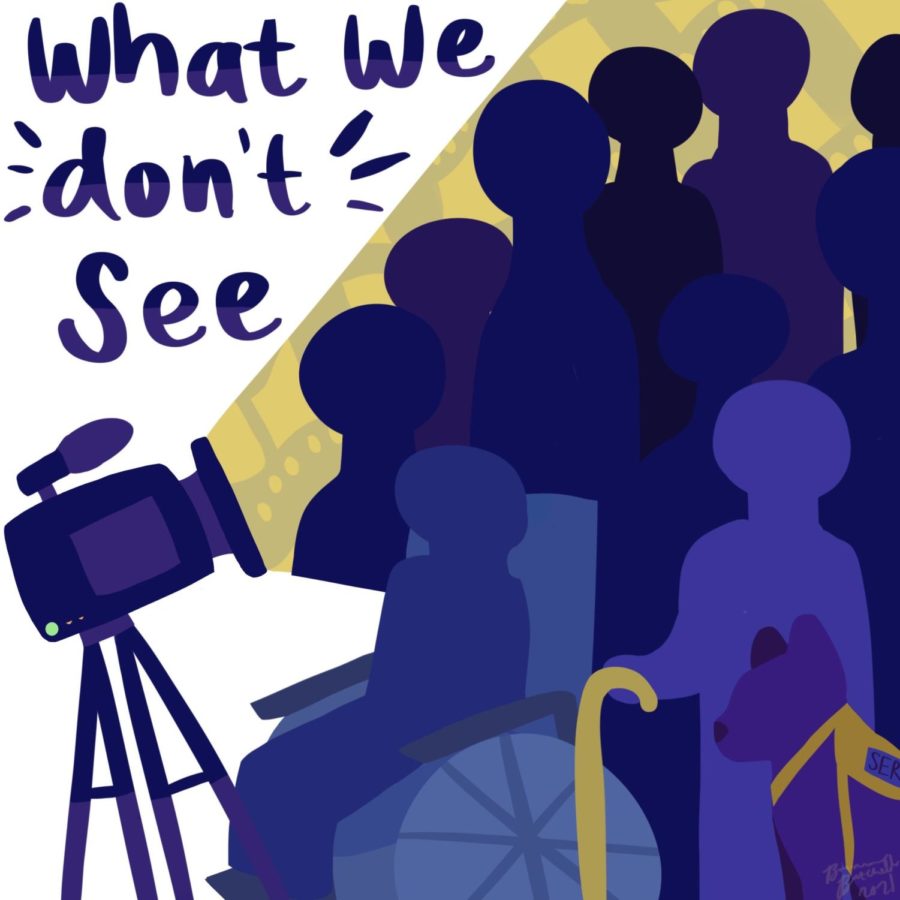Cinema’s systemic ableism
Hollywood needs to represent more (authentically cast) disabilities
Hollywood is long overdue for more inclusivity and authenticity in producing films with disabled actors.
April 1, 2021
I remember watching “Forrest Gump” in a doctor’s office waiting room when I was around 10. I was excited; I had heard about this movie — how it was a great American classic — and so, of course, I was eager to watch.
Yet, it only took me a couple of minutes before I was uncomfortable, and spoiler alert: it wasn’t because of the poorly cushioned waiting room chairs. It was because of the ableism rampant through the film. The intellectually disabled and infantilized Gump was the butt of all the jokes while Lieutenant Dan could only be whole again with prosthetic legs.
There are countless other disabled tropes unfortunately common to the film industry: the “blind-but-sees-the-world-better-than-anyone else” idea, the “I-don’t-want-to-be-a-burden-so-go live-your-life” character, the angsty and bitter wheelchair user and even the “better-off-dead” type. It’s all wrong, and it’s all ableist.
But what is ableism? In an article about ableism in the workplace, Idealist.org defines it as “…the discrimination, prejudice, or oppression of anyone living with mental or physical disabilities. The underlying premise of ableism is that disabled people are inferior to their more able-bodied or able-minded counterparts.”
Thus, true disabled representation in films lacks severely. In 2016, the Ruderman Family Foundation found that “95% of characters with disabilities on television were played by able-bodied actors.” Now, the common defense to calls of ableism is that ‘The non-disabled actors are just doing their job — they’re acting!’ However, Frances Ryan from The Guardian makes a strong comparison that points out “While ‘Blacking up’ is rightly now greeted with outrage, ‘cripping up’ is still greeted with awards.”
That truth is more than unsavory. In fact, IndieWire has reported that, if the patterns continue, an Oscar-nominated actor in a disabled role has around a 50 percent chance of taking home the trophy. It’s outrageous that non-disabled folks get a free pass to winning without a second thought that they’re rebuilding stereotypes and cliches people have worked so hard to get rid of while simultaneously putting someone qualified out of a job.
John Belusso, a late disabled playwright, believed audiences loved seeing their favorite able-bodied and able-minded actors playing disabled people because, at the end of the day, the viewer knew that it was all just a fake — they could breathe a sigh of relief that those people were not subjects to the “perils” of disability.
Bryan Cranston who played a quadriplegic in “The Upside” has four very movable limbs in real life, allowing him to walk, dance, skip — you name it. Similarly, Eddie Redmayne as Stephen Hawking in “The Theory of Everything” isn’t really “twisting and twitching” from ALS in his day-to-day life.
This type of thinking only leads to pitying folks who are actually disabled, praising those that aren’t and adding to the damaging narrative that disabled people couldn’t handle being in the spotlight.
The idea that Hollywood is too overwhelming for disabled people was used in one of the most recent outcries of ableism — Sia’s movie “Music.” Simran Hans from The Observer gives a great two-sentence summary: “…its protagonist Zu (a near-bald Kate Hudson) is a recovering alcoholic. This is confusing, given that the film’s title refers to her non-speaking, neurodivergent younger sister Music (Maddie Ziegler), whose main purpose is to absolve Zu from her troubled past.” Ziegler grunts, mumbles and uses language devices to form short, primitive sentences throughout the film. She was reported to have watched “meltdown videos” on Youtube to prepare for the role. Sia sees no wrong in the film, however, calling it “a love letter to caregivers and to the autism community.”
Well, the autistic community and much of the community at large don’t think disability saviorism and tokenism are cute. Many activists also cite its harmful representation and messaging, especially as it displays prone restraint, a pin-down technique originally used with the intent to de-escalate situations and prevent harm. Prone restraint has led to cases of abuse and even death, such as the horrific case of autistic 13-year-old Max Benson in 2018.
Still, the movie received two Golden Globe nominations.
When issues like this occur, it’s all the more reason to support disabled actors and the movies and shows that feature authentic casting. We also need to encourage the production of movies that aren’t “spotlighting” the disability — they can go beyond the surface to examine complex character traits or the exciting story, just like every other film. Recently, “Peanut Butter Falcon” and “Give Me Liberty” worked off of that idea and experienced major success.
Tim Zajaros and Christopher Lemole from Armory Films brought “Peanut Butter Falcon” to life, a comedic story about Zak, who is played by Zack Gottasgen, an actor with Down Syndrome. He runs away from an assisted living facility and goes on a crazy adventure after befriending Tyler (Shia LeBeouf). In an interview with Variety, Lemole said creating a film starring a person with a disability was a risk in audience and award appeal they were willing to take — well, it certainly paid off. After initial rejections from film festivals, they ended up making “three times its production cost at the box office” and received several awards.
“Give Me Liberty” also takes the comedic route in telling the story of a driver named Vic (Chris Galust) who is stuck between transporting relatives or helping out wheelchair-user Tracy (Lauren Spencer) during a riot in Milwaukee. The film initially struggled to get funding but eventually came through, not only creating space for the general disabled community but the Black disabled community as well. Spencer told Variety, “I ain’t never seen nobody like me on screen. Through my work, I try to show that a person with a disability is not angelic — not what we in the community call ‘inspiration porn.’ We’re just human.”
I am not saying to “cancel” the actors and directors who have contributed to issues of ableism; rather, support the ones that are combating it, recognize the fallacies and double standards presented in some films and be an active and supportive ally for the community. Forrest Gump may be stuck in the past, but the future of disabilities in film could be so bright if only we do our part.








